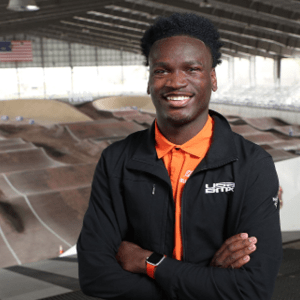
OSU Sports Medicine athletic trainer Luke Akande is the first dedicated athletic trainer USA BMX, which is headquartered in Tulsa.
USA BMX athletic trainer excited by opportunities, challenges of new sport
It’s exciting to be one of the first to do something. But it can also be nerve-wracking.
Luke Akande is one of the first dedicated athletic trainers for BMX — bicycle motocross — the sport where riders race on dirt tracks with jumps and turns that showcase athletes’ speed and style. He recently joined Oklahoma State University Sports Medicine and works full time for USA BMX out of the headquarters in Tulsa.
“It’s cool, but it’s also intimidating. There’s not a lot of dedicated BMX athletic trainers, I may be the only one,” Akande said.
He is also a first-generation American. His parents are both Nigerian and he grew up outside Atlanta. He earned his bachelor’s degree from the University of Georgia, his master’s degree from Florida International University and is a board-certified athletic trainer as well a licensed emergency medical technician.
Akande has worked as an athletic trainer with the University of Minnesota’s track & field and cross country teams, the University of Oregon’s indoor and beach volleyball teams and with a Cincinnati Reds minor league baseball team.
But he said he’s looking forward to the challenge of working with a newer sport.
“No one I went to school with or any of my mentors have worked in BMX before, so it’s new territory for everyone,” he said. “BMX sounded interesting and different. And the opportunity to work with Team USA was intriguing.”
USA BMX, the national governing body for the sport, also organizes national competitions and oversees the Olympic BMX team, which means Akande will be traveling to Paris for the 2024 Summer Olympic Games.
“I’m very excited. It’s definitely a career goal and a dream of mine,” he said.
One of the athletes that Akande works with regularly at the Hardesty National BMX Stadium in Tulsa is Payton Ridenour, who is hoping to be on the Olympic team this summer.
Ridenour has been riding BMX bikes for 16 years since she was just 5 and knows some of the most common injuries happen to collarbones, shoulders and hands as well as concussions.
“It’s a high speed and contact sport, so there’s a lot of different things that can happen,” she said, which is why it’s vital to have medical professionals including athletic trainers readily available to athletes. “I think it’s super important. I’ve had a number of injuries and it’s nice to have someone to help you. It’s been great so far having Luke here. I can just go over to him and ask him when I need something or have a question.”
Akande came to athletic training like a lot of his peers — first as an athlete. He was injured while running track in high school and worked with an athletic trainer to recover.
“I fell in love with the profession. I liked how much they get to guide athletes from their injury to recovery. Helping them out is awesome,” he said. “You get to maintain that competitive environment like you have in sports, but it doesn’t matter if you win or lose, it’s about taking care of the athletes.”
Thursday, March 28, 2024
Media Contact: Sara Plummer | Communications Coordinator | 918-561-1282 | sara.plummer@okstate.edu